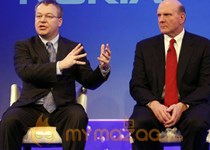With Microsoft entering into an agreement to purchase Nokia's Devices & Services business, Stephen Elop will be coming back to lead "an expanded devices team", Microsoft CEO Steve Ballmer has written to his employees.
Elop's team, "which includes all of our current Devices and Studios work and most of the teams coming over from Nokia", will report to him, the mail said.
A Nokia statement said Stephen Elop will step aside as President and CEO of Nokia Corporation, resign from the Board of Directors, and will become Executive Vice President, Devices & Services to "avoid the perception of any potential conflict of interest between now and the pending closure of the transaction".
"We are very excited about the proposal to bring the best mobile device efforts of Microsoft and Nokia together. Our Windows Phone partnership over the past two and half years has yielded incredible work - the stunning Lumia 1020 is a great example. Our partnership has also yielded incredible growth. In fact, Nokia Windows Phones are the fastest-growing phones in the smartphone market," Ballmer wrote.
The first priority is to keep driving through close, which we expect in the first quarter of 2014, following approval by Nokia's shareholders, regulatory approvals, and other closing conditions, the letter said.
Read Steve Ballmer's letter here
Listing the other key changes in the integration, Ballmer said "there are no significant plans to shift where work is done in the world as we integrate, so we expect the Nokia teams to stay largely in place, geographically".
Ballmer also laid out Microsoft's strategic rationale behind the deal in a presentation that he urged all employees to read.
THE STRATEGY: What the companies plan to do going forward
One of the interesting points here lists out why Microsoft was focusing on phones.
"Success in phones is important for success in tablets; and success in tablets will help PC," it says. It also says that the acquisition protects the future of the Windows Phone which is highly concentrated with Nokia, which has an overall 80 per cent share of the operating system.
"First party hardware ensures Windows Phone presence; OEM model alone expensive in this market position," the presentation explains.
Under the terms of the agreement, Microsoft will pay EUR 3.79 billion to purchase substantially all of Nokia's Devices & Services business, and EUR 1.65 billion to license Nokia's patents, for a total transaction price of EUR 5.44 billion in cash. Microsoft will draw upon its overseas cash resources to fund the transaction.







